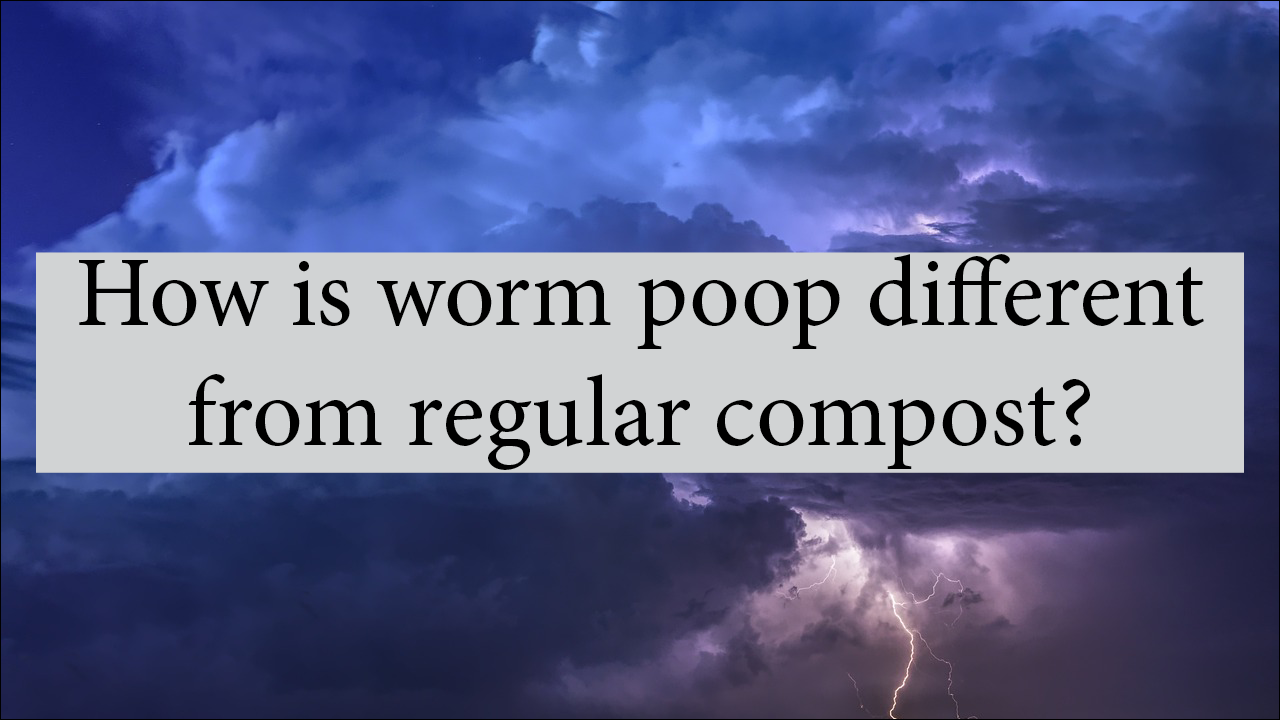
In the world of organic waste management and sustainable gardening practices, the transformation of waste materials into valuable resources is a subject of paramount importance. Regular composting has been a steadfast technique for turning kitchen scraps and yard waste into nutrient-rich soil amendments. However, a more intricate and curious method has gained considerable attention in recent times: vermicomposting, or in simpler terms, worm composting. The end products of these two processes, commonly referred to as “worm poop” and “compost,” respectively, might appear similar on the surface, but they hold profound differences that play pivotal roles in soil health, nutrient availability, and overall environmental impact.
The Journey of Decomposition: A Brief Overview
Before we delve into the differences between worm poop and regular compost, let’s understand the basics of each process.
Regular Composting
Regular composting involves the decomposition of organic matter through the activity of microorganisms (bacteria, fungi, etc.) and larger organisms (earthworms, insects) in an aerobic environment. This process typically occurs in outdoor compost bins or piles and requires a careful balance of carbon-rich (e.g., leaves, straw) and nitrogen-rich (e.g., kitchen scraps, grass clippings) materials, along with adequate moisture and aeration. Over time, these materials break down into a dark, crumbly substance known as compost.
Vermicomposting: The World of Worms
Vermicomposting, on the other hand, employs the diligent efforts of earthworms, such as Eisenia fetida or red wigglers, to expedite the decomposition process. These voracious eaters consume organic waste, breaking it down internally and producing nutrient-rich castings, often referred to as “worm poop.” Vermicomposting can be done indoors or outdoors, making it a versatile and efficient method for small-scale waste management.
Unmasking the Disparity: Worm Poop vs. Compost
While both worm poop and compost contribute to enriching soil fertility, their inherent characteristics set them apart significantly. Let’s explore the distinctive attributes that make each of them unique.
Nutrient Concentration and Availability
Worm Poop: Vermicompost or worm poop is celebrated for its exceptionally high nutrient content. Earthworms consume organic material and release enzymes that help break down complex compounds, resulting in castings that are rich in essential nutrients like nitrogen, phosphorus, and potassium. Moreover, these nutrients are present in a form that is readily available for plant uptake, promoting robust growth and development.
Regular Compost: Compost, while also nutrient-rich, might have a slightly lower concentration of certain nutrients compared to worm castings. Additionally, nutrients in compost may not be as readily available for plants as those in worm poop, necessitating further microbial activity in the soil to convert them into plant-accessible forms.
Microbial Diversity
Worm Poop: Vermicomposting introduces a unique array of beneficial microorganisms into the resulting castings. The gut of earthworms hosts a complex microbiome that interacts with the ingested organic matter, enhancing decomposition and enriching the castings with beneficial bacteria and enzymes. These microorganisms can contribute to improved soil structure and disease suppression.
Regular Compost: Composting, due to its diverse nature, also supports the growth of various microorganisms. However, the microbial profile might differ from that of worm castings due to the absence of earthworm-specific interactions.
pH and Soil Structure
Worm Poop: Worm castings are typically close to neutral on the pH scale, making them suitable for a wide range of plant species. Moreover, their texture improves soil aeration, water retention, and drainage, promoting optimal root growth.
Regular Compost: The pH of compost can vary depending on the materials used, but it tends to be slightly more acidic. Compost also contributes to soil structure improvement, albeit to a somewhat lesser extent than worm castings.

FAQs About Worm Poop and Regular Compost
Q1: Can I use worm castings and compost interchangeably in my garden?
A: While both worm castings and compost are beneficial for soil health, worm castings offer a more concentrated and readily available source of nutrients. They can be used as a top dressing or mixed into soil for seedlings, potted plants, and gardens requiring an extra nutrient boost. Compost, with its organic matter content and broader nutrient spectrum, works well as a soil conditioner and can be mixed into larger areas for overall soil improvement.
Q2: Is vermicomposting more suitable for indoor or outdoor use?
A: Vermicomposting is highly adaptable and can be practiced both indoors and outdoors. Indoor vermicomposting is a fantastic option for those with limited outdoor space or colder climates. However, outdoor vermicomposting, particularly with larger setups, can handle more waste and might be more suitable for gardeners with ample yard space.
Q3: Are there any drawbacks to using worm castings or compost?
A: While both worm castings and compost offer numerous benefits, it’s important to avoid over-application. Excessive use of worm castings can lead to nutrient imbalances, just as overusing compost can alter soil structure. It’s best to follow recommended application rates and monitor plant health.
The distinctions between worm poop and regular compost are more than skin-deep. While both contribute to soil fertility and plant growth, their unique attributes make them suitable for different applications. Whether you’re nurturing a home garden, managing urban waste, or striving for sustainable agricultural practices, understanding these differences empowers you to make informed choices that align with your goals and contribute to a greener, healthier planet.
Discover the wonders of worm castings and their role in soil enrichment. Tater Junction offers top-quality vermicompost to promote sustainable practices in your garden.